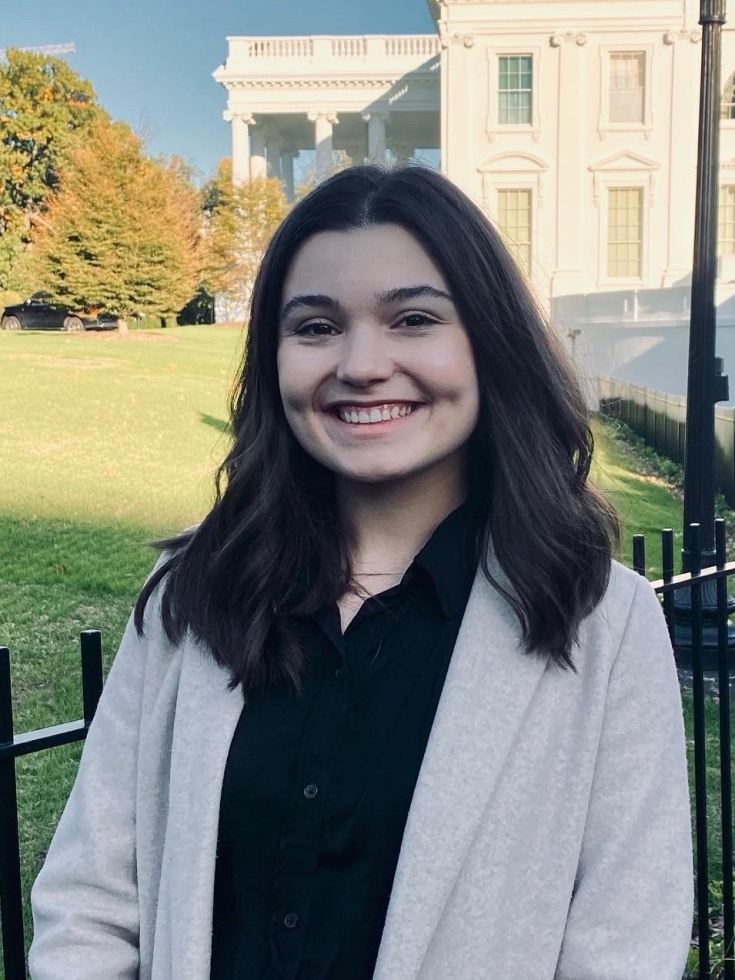Saylor Lewtschenko combines her studies in Brown’s Online MPH program with her work for the U.S. Department of Veterans Affairs, where she works with data to improve support and services for older Veterans. In this interview, Lewtschenko shares her path to public health through her family connection to Veterans’ health care, how she uses data to improve elderly Veterans’ health options and her advice for public health professionals just getting started in their careers.
What led you to pursue an education and career in public health?
I am from a very rural community with a population of around 700 people. Our closest hospital is 45 minutes away. After watching my mother experience health issues and seeing firsthand all the shortcomings of our medical system, I knew I wanted to work in the health care field. I thought I wanted to be a doctor, so that led me to a medical conference in Washington, D.C. where the American Medical Association was promoting public health in medical education. I was really interested in politics, and public health seemed like the perfect mixture of both. This led me to the University of Rochester where I got my bachelor’s degree in health policy and to my career with the U.S. Department of Veterans Affairs (V.A.).
Can you tell us more about your mother’s experience within the health care system?
My mom was a firefighter in the Air Force. She was medically discharged in the ‘90s after being diagnosed with sarcoidosis, a lung disease most likely caused by the chemical exposure that came from doing her job. Many years later, she started developing other mysterious illnesses: fibromyalgia, small fiber neuropathy, the list goes on.
For a long time, we have been trying to determine if she's eligible for V.A. benefits, but it doesn’t seem like she will be because she served in the military before the September 11 attacks.
Recently, with the improvements under the PACT Act, which was passed in 2022 and extended benefits to Veterans—specifically people exposed to burn pits and other toxic substances while serving—any post-9/11 Veteran can walk into a V.A. facility and get free care without officially enrolling in health care benefits. But there are still a lot of Veterans that cannot do that. They're not eligible for benefits like the GI Bill or V.A. home loans. So my mom is not alone; it’s an ongoing challenge to navigate.
Did your mother's experience within the health care system inspire you to pursue a career in Veterans’ health?
It did influence my decision. In my sophomore year at the University of Rochester, I took an “Introduction to Public Health” course that had many guest lecturers. My current boss actually gave a lecture on Veterans’ health and I thought it seemed interesting. My mom was a Veteran and my husband was in the military at the time, and I could see myself working for the V.A., so I reached out to learn more. It turns out that the University of Rochester does a lot of work with the V.A., specifically with the Department of Geriatrics and Extended Care.
Eventually, I interned for the V.A. and then later I became a government contractor. After graduation, I was hired on as a Health Science Specialist and currently work for the Geriatrics and Extended Care Data Analysis Center. It has given me a lot of skills. I didn't think I would be working with data at all, but I love it! My work at the V.A. combines all of my interests: Veterans’ health and elderly patients.
What influenced your interest in geriatric health?
Honestly, I love older people and have always had an interest in geriatrics. My grandparents helped raise me and I have a super strong connection with them. I want to advocate for elderly people because so many are treated unfairly. A lot of elderly people don't have family members to take care of them, or their family members are getting older. Elderly people are just generally more forgotten, and I want to make their lives better.
